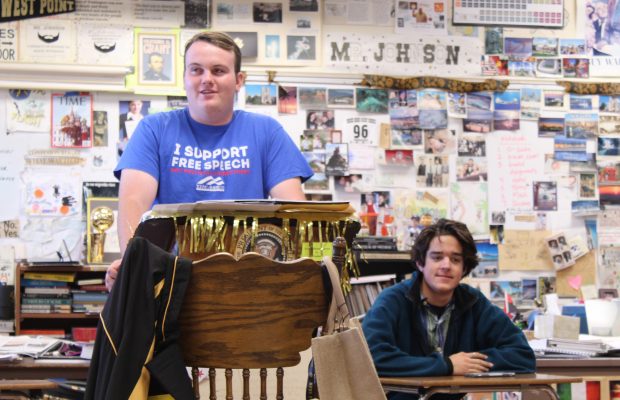Amnesty International promotes political discussion

“Stepping in a puddle with socks on is just the worst.”
This, along with many other “issues” that NPHS students face on a daily basis, is a classic first-world problem: an extremely minor issue that does not affect one’s freedom or capabilities as a human being. As a result, it is often easy to overlook the pressing concerns that people in developing countries face all over the world. This is why Amnesty International exists, which has its own branch here at NPHS.
Stephen Johnson, history teacher, has been the club advisor for 15 years. “Amnesty International is an international organization dedicated to the preservation of human rights,” Johnson said. Established in 1961, the organization campaigns to end torture, the death penalty and persecution over political beliefs, among other matters. The club meets every Friday at lunch in Johnson’s room.
Gus Gress, sophomore, joined the club on the first Friday of his freshman year. “I joined because… I’ve always been really intrigued by politics and I really wanted to get myself involved in that throughout high school,” Gress said.
During meetings, Gress helps to plan formal debates during lunch, which is the primary strategy Amnesty uses to bring awareness to significant issues across the globe. Between either two students or a student and a teacher, the debates promote a larger conversation about issues students many students do not encounter here at NPHS. “(Debates are) a lot of fun because it’s a bunch of kids in one room, talking about politics.” Gress said.
Amnesty International held a formal debate on Oct. 12 discussing the systems of socialism and capitalism, including how each can benefit a modern America. The debaters were Sam Church, senior, and Kyle Reusch, senior, representing socialism and capitalism respectively. Almost every seat in Johnson’s room was filled with students who listened to each perspective and asked thought-provoking questions to Church and Reusch. After half an hour of debating, Reusch was voted as the winner of the debate.
More than anything, Amnesty International is able to foster a community of people who are interested in politics. Church, who has been a part of Amnesty for three years, states that that is his favorite part of the club. “We’ve had a lot of really great conversations as a club… just talking about our opinions and how we think we can make our world a better place. That’s a really great part of what (Amnesty) is,” Church said.
